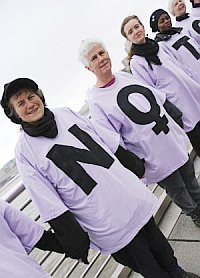Editorial
The voices of silences and the cries of powerlessness in a changing international system
When I was thinking about the presentation of the publication of the Barcelona Declaration on the Human Right to Peace (http://www.gencat.cat/icip/pdf/DeclaracioICIP_010610_.pdf) in five languages, I emphasised the increasingly central role in society and the international system of individuals and therefore of the private organisations that individuals create, some of which are linked to civil society and others to the world of business and enterprise.

We are in a new international situation, which took shape in the early 1970s, in which various actors are simultaneously trying to free themselves from state supervision. We are witnessing the replacement of the classic international system, with clearly defined frontiers and rules of operation, by a globalised social system with emerging trends that are sometimes contradictory: globalisation, regionalisation, fragmentation and localisation. This system has vague outlines, a partially random system of regulation and involves various types of logic. The predominant phenomena is globalisation, i.e. the intensification and internationalisation of cross-frontier relations of all types by means of factors such as technological changes that enable time and space to be compressed, which affects both economic and social relations.
This process of replacement is slow, inconsistent and incomplete. This explains the coexistence of interactions, patterns and trends and operating regulations of the old system: in classic terms, the old one is not dead and the new one has yet to thrive.
That is the reason for the persistence of long-term conflicts and situations such as the Sahara conflict and the failure to implement the 1991 agreement, sanctioned by the United Nations and hindered by the failure to agree on a census and a mechanisms for implementing the contents of the resolutions, which is a case of self-determination that therefore implies creating some sort of mechanism providing the population with the right to decide on its future. For this reason, conflicts often develop and lead to further violent episodes, that are partially linked to the initial causes, as occurred in the Sahara in November 2009, where the social dimension – the real and objective social and economic deprivation of the Sahrawi population; and the relative deprivation, by comparison with the situation among the Moroccan colonists – took precedence over the right to decide in the demands of the protest camp organised in the occupied territories. That is why the voices of the silences are also audible, as both states and global civil society speak for them: the ongoing inability of the United Nations, i.e. of its member states, and especially the five countries that invoked the idea of "equal states but with unequal responsibilities" in 1945 to justify their status as permanent members of the Security Council; the gallant role of Spain, as the ex-colonial power, and many others. That is also the reason for the partisan use of facts, even before they have been ascertained, and the trivialisation and inappropriate use of essential and precise concepts such as genocide and the persistent use of prohibitions of the right to information: to put it in terms of the theory of communication, it is a way of making noise, to prevent the eloquent voice of so many silences.
Finally, this coexistence of systems also explains the constant eruption into our lives of the cries of powerlessness, from those suffering directly from injustices and inequalities, but also from those organising the fight against them, who create tools to construct hopes and transform conflicts. These cries frequently repeat the social aspect of globalisation, which infuses areas as varied as social life and communications, security, ecology and the environment, the regulation of everyday life, human rights, culture and ideology. There is a growing interconnection between subjects and people, arising from the fact that we live in a "global village", the seedbed for "globalised societies." This is precisely the context in which we have to place the "In depth" blog in this issue of the magazine, which is written by women building peace, who are the leaders n the medium- and long-term, but who are currently invisible and present. They are invisible because they are part of civil society and because they are women; present, because they are women and have different and more inclusive ways and methods and above all, they emphasise the transformation of social relations, a wide-ranging in-depth change over the long term.
They give us a lesson: how to work effectively to accelerate change in the international system and return to normality: silences and voices as distinctive spaces.